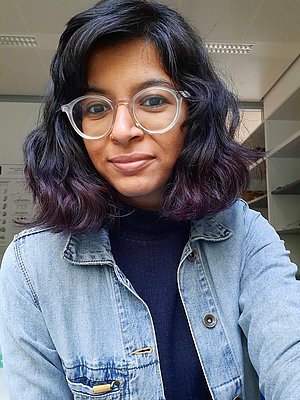Dr. Richard Beckmann, a proud alumnus of the RESOLV iGSS program, completed his PhD in 2023 in the group of Prof. Dominik Marx, where he explored the fascinating world of molecular solvation at a fundamental level. Driven by curiosity and a passion for practical impact, he transitioned into the field of surfactants and is now advancing his research as a postdoctoral fellow at Chalmers University in Sweden.
1. Can you briefly introduce yourself and share how your journey in science led you to join the iGSS/RESOLV program and eventually pursue a postdoc?
I have had a long journey. I originally started studying physics in 2012, did a quick stint in psychology for 2 years before I decided I want to go back into natural sciences. So I started studying biochemistry at RUB in 2015 and eventually joined the master’s program at the faculty of chemistry. During my in depth practicals, I discovered theoretical chemistry at the group of Prof. Schäfer and was immediately convinced that I want a research career in this field. After half a year in this master’s program, I found out RESOLV’s fast track program which allowed me to skip the 2nd year of master’s and directly enroll into the PhD which I did at the group of Prof. Dominik Marx. I worked on solvation under extreme conditions, mainly focussing on how different solutes affect liquid helium by computing spectra using Path Integral simulation techniques and Machine Learning potentials. I continued as a postdoc in the same group for a year after finishing my PhD to wrap up some projects while looking for the next job. I was open to the idea of going to the industry or working as a postdoc and I applied to both types of positions. I got lucky and was accepted at 3 different groups but eventually decided to join the “AI Laboratory for Molecular Engineering” group headed by Dr. Rocio Mercado at Chalmers University, Gothenburg in Sweden.
2. Could you describe your current research and what excites you most about it?
My current project deals with materials discovery, in this case surfactants for semiconductor sketching, and solvation is still a big part of my research. When I was part of RESOLV, I was looking at how a particular solute affects the solvent around it. Now I am designing the solute in such a way that it affects the solvent (water) in particular ways that we want. We want to reduce the surface tension of water and are looking at molecules that can do this optimally.
What I care about here is molecular discovery. I believe that these days, we have come so far with theoretical chemistry that we can design molecules from scratch using our physical and chemical knowledge. Everyone these days is excited to train models, everyone loves turning data into models. That’s great but what I like the most about my project is that I am on the other side of the equation. I am the one building the database. We are making sure that the data on which future models will be trained has a solid foundation. This is a less popular but very important step and I am excited about that. This is the need of the hour.
3. What does a typical day look like for you as a postdoc?
I start my day walking my beloved dog, then have breakfast while reading research articles. I go to the university not too early, so around 10. Usually I have one meeting every day of the week, with for example, my master’s students, or my supervisor, or my collaborators. I also organize weekly seminars at the department, so I get to entertain and have one on one time with guests. I spend most of my day working on my simulations, writing scripts and generating data. Sometimes, I also have coffee breaks with my colleagues where we discuss each other’s problems and try to solve them. I like the routine of my work days and find it relaxing.
4. What are some of the biggest differences you’ve noticed between life as a PhD student and as a postdoc?
First of all, the degree of independent work: as a postdoc, I am expected to be much more independent. I also have much more responsibility - supervising students, organizing seminars, and entertaining guests. There are certainly more expectations to fulfill but I also feel that I have become more mature than I was as a PhD student. Failures do not hit as hard anymore, and everything feels less drastic. I feel more independent.
5. How has your experience as a postdoc shaped your ideas about your future career path?
The big thing that I realized as a postdoc is that whatever the future career path - whether industry or academia - but especially in academia, I need to carve out a place for myself. I need to come up with a vision or idea that is suited to my expertise. This is something that I never really thought about before, and I think this is never really mentioned during our PhD training. As a postdoc, I am directly learning from an assistant professor about the path that leads to an academic position.
6. What advice would you give to PhD students who are thinking about their next steps?
It is important to not take failures too harshly. Keep in mind that at the end of the day, it is a work project and even though you care a lot about it, sometimes things fail. Do not hesitate to take a step back. It is important to take breaks. I noticed multiple times during my PhD (and even now sometimes) that once I get stuck on a project, I go so deep down the rabbit hole and focus on just this one task, that after some time I start falling apart. What helps is taking some time off, doing something different, or just going on holidays. I am then able to solve a problem on the first day back that I was stuck on for three weeks. This is the kind of advice that we are usually not willing to take ourselves but I really believe it is good advice.
-----------------------------------------------------
About the author


